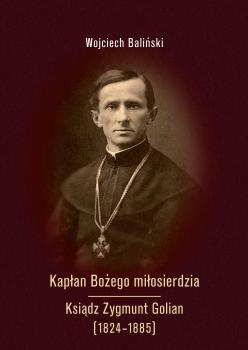Kapłan Bożego miłosierdzia: Ksiądz Zygmunt Golian (1824–1885)
Słowa kluczowe:
Kościół katolicki w XIX wieku, kaznodziejstwo, Zgromadzenie Sióstr Matki Bożej Miłosierdzia, ultramontanizmStreszczenie
Ks. Zygmunt Golian urodził się w Krakowie 9 lipca 1824 roku w rodzinie lekarza chirurga. Wychowywał się głównie w Krakowie, gdzie ukończył Gimnazjum św. Anny oraz seminarium duchowne prowadzone przez księży misjonarzy na Stradomiu. Został wyświęcony na księdza 26 grudnia 1849 roku. Wkrótce wraz ze swym przyjacielem ks. Wincentym Popielem (późniejszym abp. warszawskim) wyjechał na studia najpierw do Louvain w Belgii, a następnie do Rzymu. Edukację zakończył na Uniwersytecie Rzymskim La Sapienza jako doktor w 1853 roku. Już w czasie studiów teologicznych zasłynął z wielkiego talentu kaznodziejskiego i pogłębił tę umiejętność w czasie studiów za granicą. Był mistrzem słowa, wybitnym erudytą, znawcą Pisma Świętego oraz filozofii św. Tomasza z Akwinu. Po powrocie do Krakowa zaangażował się w obronę doczesnego panowania papieża Piusa IX i Państwa Kościelnego, które istniało przez ponad 1100 lat i było gwarancją niezależności politycznej i ideowej papieży. Presja nacjonalizmu włoskiego oraz wrogów Kościoła związanych z masonerią, wycofanie się cesarza Napoleona III z pomocy dla papieża w wyniku wojny francusko-pruskiej i obojętność większości katolików spowodowały, że nie udało się obronić Państwa Kościelnego. Ks. Golian był niewątpliwym patriotą, a równocześnie przeciwnikiem wykorzystywania Kościoła do realizacji dążeń niepodległościowych, które podjęto w Królestwie Polskim po klęsce Rosji w czasie wojny krymskiej. Z tego powodu przeciwstawiał się manifestacjom patriotycznym w kościołach i zaangażowaniu duchownych w działania konspiracyjne, a szczególnie skrytobójczym metodom stosowanym przez „czerwonych”. Wymagało to charakteru, mocnych przekonań i odwagi.
Rozdziały
-
SPIS TREŚCI
-
Wstęp .......... 11
-
I. Młodość, studia i pierwsze lata kapłaństwa .......... 19
-
II. Ksiądz Zygmunt Golian w Warszawie .......... 53
-
III. Krakowski duszpasterz .......... 103
-
IV. Obrońca doczesnej władzy papieża .......... 159
-
V. Proboszcz wielicki .......... 187
Downloads
Bibliografia





